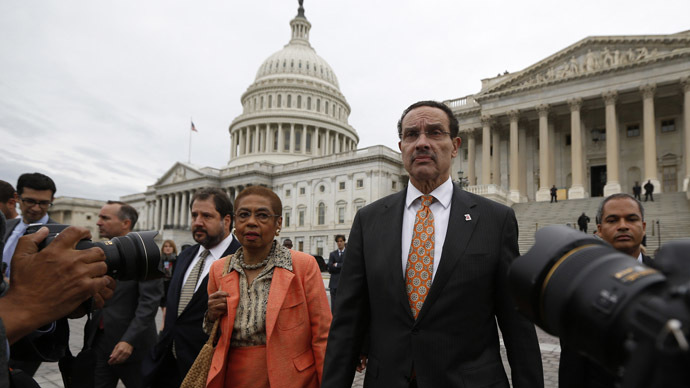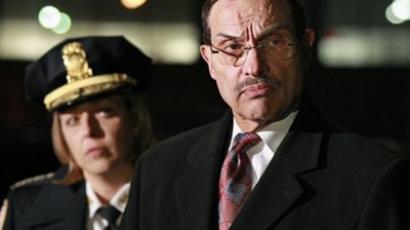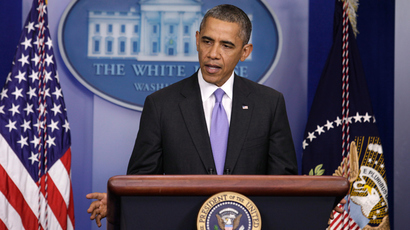Congress blocks DC from funding marijuana decriminalization, abortions

House Republicans blocked funding for the District of Columbia’s marijuana decriminalization law, as well as prohibited the nation’s capital from spending its own money on abortions for low-income residents in the city.
All legislation passed by the DC City Council faces a 60-day mandatory congressional review period before it becomes law, and Congress has authority over the District’s budget, according to the 1973 Home Rule Act. On Wednesday, the House Appropriations Committee passed a spending rider amendment to block the city’s law to decriminalize possession of up to an ounce of marijuana, which was signed by Democratic Mayor Vincent Gray in April. The law, which is supposed to go into effect in July, takes marijuana possession down from a misdemeanor to a civil violation with a $25 fine. Under the old law, misdemeanors for possession carried up to six months in jail with a $1,000 fine.
Rep. Andy Harris (R-Md.) introduced the spending rider to the 2015 Financial Services and General Government Appropriations bill, which includes $637 million in federal appropriations to the DC government – $66 million below what the city requested. Harris, whose home state just decriminalized marijuana, felt the law’s fines were too low and would lead to a spike in drug use among minors, WUSA reported.
“Congress has the authority to stop irresponsible actions by local officials, and I am glad we did for the health and safety of children throughout the District,” Harris, a second-term, Tea-Party conservative and doctor, said to The Hill.
Del. Eleanor Holmes Norton (D-DC) slammed Harris’ involvement in city matters. “He is acting contrary to the laws of his own state, which recently decriminalized marijuana,” she said. “It is particularly offensive that he is trying to impose on another member’s district what he was unable to do democratically in his own.”
The non-voting member of Congress added that Harris “appears to be following in the most exploitive tradition of some Republicans who try to use DC to establish their conservative bona fides and raise their national profiles by interfering in the District’s local affairs.”
Rep. José Serrano (D-NY), whose family is from Puerto Rico, said Republicans’ interference amounted to DC “colonialism,” the Washington Post reported.
A representative whose district is closer to home for the District also derided the GOP for imposing its will on the city, which has a Democratic majority.
“The DC voters elected people. They made the decision, and it seems to me that we ought to respect that,” Rep. James Moran (D-Va.) said. “It just doesn’t seem right that the Eastern Shore of Maryland can reach over into DC and make laws for DC. It’s not the way this country is supposed to function.”
DC voting rights advocates weren’t the only ones to slam the amendment. Groups supporting the decriminalization of marijuana also expressed their dissatisfaction with congressional meddling.
“The District of Columbia wisely decided to stop wasting its own resources enforcing ineffective and racially biased laws and to allow those with serious illnesses whose doctors recommend it to use medical marijuana,” Marijuana Police Project spokesman Dan Riffle said to the Washington Times.
“Unfortunately, unlike every state in America that gets to determine its own laws, Washington, DC laws are reviewed by Congress where Washington, DC residents have no voting representatives.”
Harris’ amendment passed 28 to 21, with Texas Rep. Henry Cuellar being the only Democrat to vote for it. The rider bars the District from spending city funds to enact the decriminalization law. But it also doesn’t re-criminalize the drug, which could put pot in legal limbo within city limits, according to local blog DCist.
"Basically what would happen is, this amendment—the way it's written—would not re-criminalize or rewrite the laws around criminalization of marijuana," Dr. Malik Burnett, policy manager for the Drug Policy Alliance, said to DCist. "Police issuing tickets to people who they found to have marijuana on their person wouldn't be able to do so, that would create a sort of de facto legalization."
The pot decriminalization rider was not the only one passed by the Appropriations Committee over DC’s objections. One perennial rider bars the city from spending government funds — including money generated from local taxes — on providing abortions for low-income women in the District, except "where the life of the mother would be endangered if the fetus were carried to term, or the pregnancy is the result of an act of rape or incest,” DCist reported.
Other riders include forbidding the local government from spending federal money on needle distribution and medical marijuana programs. One cut funding for DC police officers to commute in their cruisers when they live outside the District. Another recommends cutting federal funds to the DC Tuition Assistance Grant program by $10 million, from its current $30 million.
While Democrats decry Congress stepping into the District government, Republicans believe it is their job to oversee the city.
“The federal government has a unique relationship with the city of Washington, DC,” Rep. Ander Crenshaw, (R-Fla.) said to the Post. “We, the federal government, pay for the city’s courts, we pay to house their prisoners, and I think we pay for a few other things... so the Constitution says we have the power to exercise — in all cases — over this District. And that is what we do.”
Congress did throw the DC government one bone, though. The appropriations bill does extend the provision that allows the DC government to continue operating if the federal government shuts down. The agreement was reached between Capitol Hill and the District after the last shutdown in the fall.
The Financial Services and General Government Appropriations bill, with its attached riders, now goes to the full House of Representatives. If it passes, it will have to be reconciled with the Senate version of the bill, “which is almost assured to include no such restrictions on DC,” according to the Post. The president would then have to sign the bill for it to go into effect.














